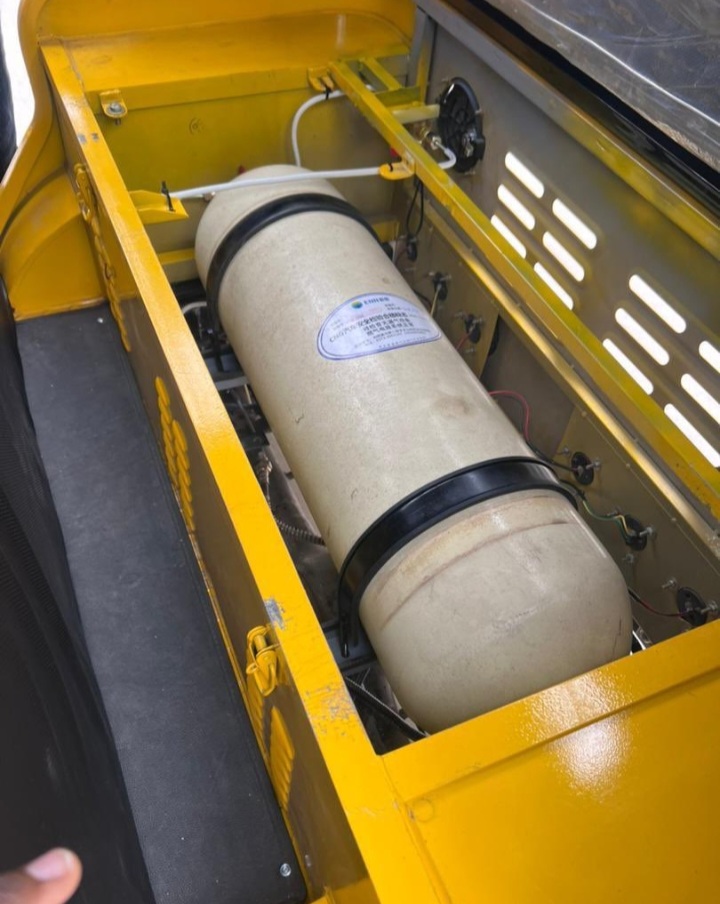All Eyes On Tinubu’s CNG Vehicles, Tricycles

By Femi Akinola
Compressed Natural Gas (CNG) vehicles emit less green houses gasses when compared to petrol vehicles, making it more environmentally friendly.
Experts disclosed that the use of CNG would extend the life of a vehicle’s engine with very low carbon because gas is cleaner fuel compared to petrol.
CNG burns cleaner than petrol, which can result in less engine wear and potentially longer engine life. Gas will not contaminate engine oil and that will give the engine good lubrication.

Consequently, businesses, including marketers of petroleum products are converting their diesel trucks to CNG. Possibly the main reason behind the Federal Government option for CNG vehicles and tricycles scheduled for inauguration next month.
After a safety document on 80 standards and regulations, the Federal Government has embarked on deployment of CNG buses and tricycles and set a vision to get a minimum of one million natural gas propelled vehicles on Nigerian roads by 2027 believing that this will mark a major energy transition in the country’s transportation industry.
The goal of the Federal Government is that the use of more expensive diesel and PMS will gradually be phased out, when many vehicles, including trucks run on natural gas, which Nigeria has in abundance, in at least 30 out of the 36 states in the country. For the fact that one of the main causes of air pollution is primarily the amount of gases emitted by petrol and diesel engines.
Some foreign countries such as Iran, China, Brazil, Argentina, Italy, have built fleets of natural gas powered vehicles, instead of going the route of relying on liquid petroleum products propelled vehicles. It is a fact that natural gas vehicles reduce tail pipe emission by up to 40%.
Hence, Nigerian Government commitment to this course will enable the country meet her national determined commitments (NDCs) under the Paris Climate Accord to which Nigeria was a signatory.
From the end of next month, Nigeria will join the nations that already have large fleets of CNG vehicles. Last week, the President Bola Tinubu led administration said it has taken a bold step in driving Nigeria to the desired destination on changing from petrol run vehicles to CNG vehicles and tricycles too.
Four plants owned by JET, Mikano, Mojo, and Brilliant EV located in various parts of the country are involved in the assembly of the Semi Knocked Down (SKD) components of the CNG buses.
According to the Presidency, JET, which has received the SKD parts is coupling the buses in Lagos and is working twenty four hours a day towards delivering 200 units of these buses before the set target of May 29, 2024.
Brilliant EV on its own will assemble electric vehicles. The electric vehicles to be produced by this company are meant for states such as Kano and Borno, which do not have access to CNG for now. Its products will also be available in key Nigerian cities and university campuses, according to the federal government.
In all, over 600 buses are targeted for production in the first phase. That aside, a new plant on the Lagos-Ibadan Expressway is set to assemble thousands of tricycles. The SKD parts manufactured by the Chinese company LUOJIA in partnership with local partner to support the consortium of local suppliers of CNG tricycles. About 2,500 of the tricycles are expected to be ready before the end of next month.
The Presidency noted that thousands of conversion kits for petrol powered buses and taxis that wish to migrate to CNG are ready with with CNG cylinders. The Tinubu’s government said it intends to provide the kits at subsidized rates, especially to commercial vehicle drivers to reduce the cost of public transport.
According to the government, as part of private sector collaboration, NIPCO and BOVAS are involved in offering refilling services for the CNG vehicles and also serving as conversion centres. In addition, NIPCO will set up 32 stations nationwide to offer the services. Likewise, BOVAS will set up eight stations in Ibadan, two each in Ekiti, Abuja and four in Ilorin. MRS is also involved but it is yet to announce where its refilling stations and conversion centres will be positioned.
The NNPC Limited, the government noted, which had launched an on-and-off CNG initiative in the past is also joining the new initiative.
In addition, it was disclosed that the PCNGI in collaboration with the Nigeria Standard Organisation (SON), and Nigeria Automotive Design and Development Council, will deliver 80 Natural Gas Vehicle Conversion and Associated Appliances Standards for the country.
And for proper monitoring, it was learnt that the PCNGI will also launch MYCNG.NG App. “The app will embed the Nigeria Gas Vehicle Monitoring Systems, which will show CNG conversion and refuelling sites in the country. The PCNGI is set to deliver 100 conversion workshops and 60 refuelling sites spread across 18 states before the end of this year”, said Mr. Bayo Onanuga, the Special Adviser to President Tinubu on Information and Strategy.
No doubt, Tinubu will eventually be regarded as the enabler of the evolving CNG industry in Nigeria, if all that was promised by his government to ensure Nigeria join other countries that operate fleet of CNG vehicles take place as Nigerians are made to believe.
Till May 29, 2024, when the government will mark one year in office, taking Nigerian factor into consideration, all eyes of the people are on the promises made by the Tinubu led administration on operations of CNG vehicles and tricycles in Nigeria.

